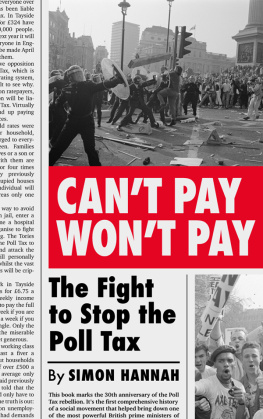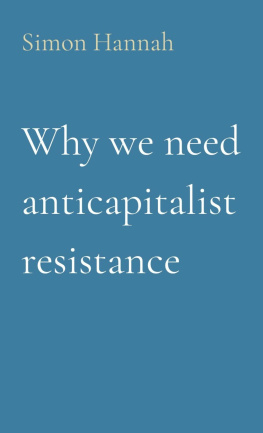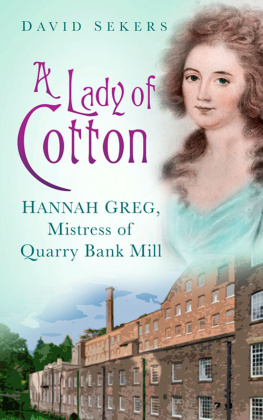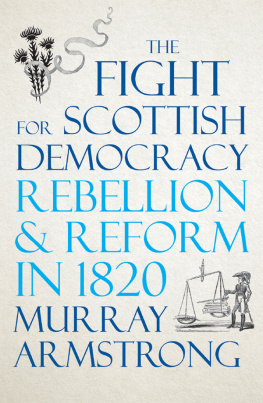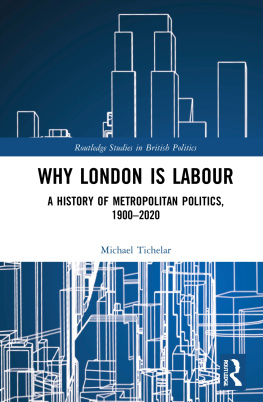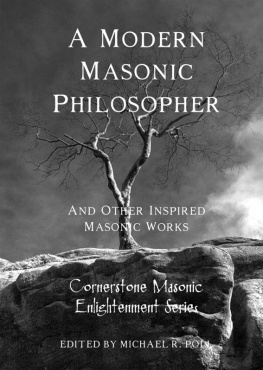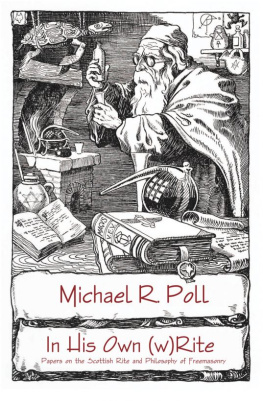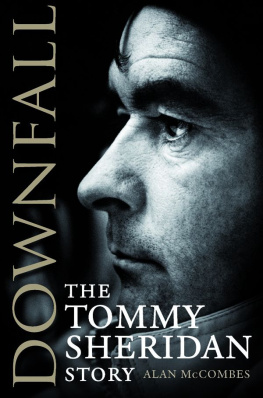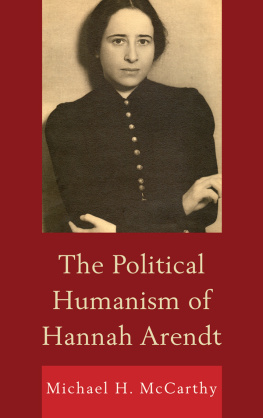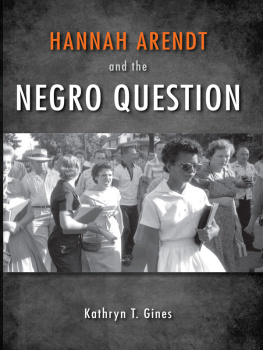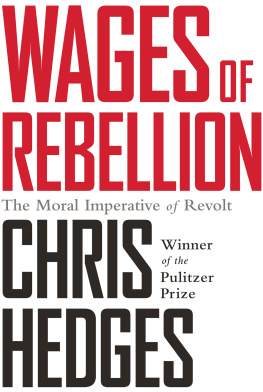Cant Pay, Wont Pay
Cant Pay, Wont Pay
The Fight to Stop the Poll Tax
Simon Hannah
First published 2020 by Pluto Press
345 Archway Road, London N6 5AA
www.plutobooks.com
Copyright Simon Hannah 2020
The right of Simon Hannah to be identified as the author of this work has been asserted by him in accordance with the Copyright, Designs and Patents Act 1988.
British Library Cataloguing in Publication Data
A catalogue record for this book is available from the British Library
ISBN 978 0 7453 4085 2 Hardback
ISBN 978 0 7453 4081 4 Paperback
ISBN 978 1 7868 0604 8 PDF eBook
ISBN 978 1 7868 0606 2 Kindle eBook
ISBN 978 1 7868 0605 5 EPUB eBook
This book is printed on paper suitable for recycling and made from fully managed and sustained forest sources. Logging, pulping and manufacturing processes are expected to conform to the environmental standards of the country of origin.
Typeset by Stanford DTP Services, Northampton, England
Simultaneously printed in the United Kingdom and United States of America
Dedicated to those who were imprisoned fighting the Tory Tax
Contents
Preface
As this book was being prepared for publishing, Boris Johnson led the Conservative Party to a decisive electoral victory on 12 December 2019. This defeat sent demoralising shock waves across the left. The spectre of a never-ending Tory government, headed by a narcissistic liar and born-to-rule populist demagogue, left many in despair. This was compounded by the apparent defeat of the politics of the Labour left at the ballot box.
But it is my deepest hope that people draw some inspiration from the political history told in this book. After all, the Tories seemed unassailable by the late 1980s; Thatcher was the victor of three elections in a row and the person who crushed the miners union. The sense that they couldnt be beaten, that neither Labour nor the powerful British trade unions could make a dent against the Tory juggernaut, was a palpable one.
Despite this, there were people who stuck with the fight, who kept going even through defeat, that proved their mettle at a time when it seemed the forces of history were against them. Those people helped form the backbone to the anti-Poll Tax movement. They established the first anti-Poll Tax Unions, put up the posters, defied the bailiffs and faced potential imprisonment. They were the ones who led much wider forces into battle against the government and eventually won.
It took work, and it ultimately meant not relying on the trade unions or the Labour Party. Dont misunderstand this point, these institutions should not be abandoned as sites of struggle. Often in times of political and social crisis people have to form their own organisations and be prepared to go it alone. Waiting for the Labour Party to actively support a practical struggle has historically been a recipe for paralysis. Indeed, Labour showed in 1992 it could snatch defeat from the jaws of victory quite easily, even after a mass movement dealt the Conservatives a devastating blow.
In the fights to come there is no doubt that there are huge stakes. With a populist, authoritarian, right-wing wave sweeping the globe, standing firm, organising and overcoming a feeling of despair or defeat, is what will make all the difference.
This is the story of the last mass movement in Britain that helped bring down a Tory prime minister. What happens next will be decided by you .
Introduction
In this world nothing can be said to be certain, except death and taxes.
Benjamin Franklin
In 1990 Trafalgar Square was witness to scenes of violence the like of which had not been seen in central London for a hundred years. It was a cry of sheer frustration and anger at the Conservative Governments flagship policy of the Community Charge otherwise known as the Poll Tax. The tax was based on a simple principle: that everyone should pay the same for local services, a duke as much as a bin man (or a waste disposal officer in todays parlance). The Poll Tax was the pinnacle of the Thatcherite programme, the epitome of the New Right ideology. But it was subsequently described by Ivor Crewe and Anthony King in their 2013 book, The Blunders of our Governments, as a colossal blunder. We might be tempted to call it the blunder to end all blunders. What went wrong?
It was not the riot alone that sank the flagship. It was a mass nonpayment campaign, fought on council estates and in communities up and down Britain, which defeated the tax. Alongside the events in Trafalgar Square there were clashes with police outside council chambers, lobbying of councillors, community pickets outside homes to stop bailiffs, hundreds of court appearances, arguments with judges, and prisoner solidarity campaigns. It was the work of thousands of people collectively organising against the wishes of the Labour Party and the trade union leaders that achieved success.
The terror of another Poll-Tax-style rebellion remains even 30 years later. Since the Conservatives re-entered government in 2010 there have been several policies that have invited comparison with the ill-fated Community Charge. It is a common refrain for politicians and journalists to warn that some unpopular government measure will be the next Poll Tax. John Major and Gordon Brown both warned that Universal Credit could trigger a similar scale of fight back.
None of those government measures, however, provoked a mass popular response. The reason for that was obvious the Poll Tax affected everyone, whereas changes to welfare benefits, for example, affect only those in receipt of such benefits. Whilst protests and campaigns can emerge from such measures, they lack the generalised nature of the resistance to the Community Charge.
This book is a historical account of the background to the Community Charge and how a mass movement defeated it. It will bring together policy analysis, arguments around the role of the official labour movement, critical appraisals of political tendencies like Militant, the anarchists and the rest of the far left, as well as the day to day work of campaigners, whether on protests or in the courtrooms.
There have been other accounts of the events surrounding the Community Charge, most of them written shortly after the tax was abolished. David Butler, Andrew Adonis and Tony Travers wrote an account of the Poll Tax from the perspective of Whitehall and its failure of governance. Militant activist Tommy Sheridans account provided a sense of the movement seen through his eyes an essential account, considering his role in the campaign. Maureen Reynolds, also a Militant member and treasurer of the All Britain Anti-Poll Tax Federation, produced a very useful report of her experiences, focused on the North West. From an anarchist perspective, Bristol-based Danny Burnss pamphlet Poll Tax Rebellion adds a helpful counter-balance to some of the mainstream lefts narratives. The story presented in this book will bring all these threads together, from the machinations of Whitehall to the resistance on estates in places like Pollok.
The book starts from the view that the mass movement against the Poll Tax was a decisive factor in ending the policy. It examines the role of the campaign in the political backlash that led to Thatchers resignation in November 1990. It also tackles some of the more difficult questions, such as why a mass movement that helped bring down Thatcher and abolish a hated tax still saw the Conservatives win the General Election in 1992. Alongside the authors of all the books, articles and pamphlets cited in the text I want to thank all the people who gave interviews, provided materials and photos as well as everyone who read draft chapters and gave feedback. Any errors are of course mine.

